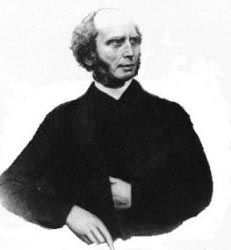 Charles Finney relates a very unusual story in his Autobiography, one that has stayed with me ever since I first read it back in the mid-1970s. He was carrying out his ministry as a traveling evangelist when he was approached by an elderly man who asked him to come preach at his village, a place that had never had any religious services.
Charles Finney relates a very unusual story in his Autobiography, one that has stayed with me ever since I first read it back in the mid-1970s. He was carrying out his ministry as a traveling evangelist when he was approached by an elderly man who asked him to come preach at his village, a place that had never had any religious services.
Finney went with the man and, as was his custom, simply relied on the Lord for guidance as to what to say. He had no prepared text, he didn’t know the name of the village nor the man who had brought him there. Things didn’t start well as the singing was so awful he had to put his hands over his ears to endure it. When it came time to preach, he felt led to speak about Abraham receiving the Word of the Lord regarding the destruction of Sodom. Finney spoke of the evil practices of the people of Sodom and how Lot was the only righteous man living there. I’ll let him tell the next part:
While I was relating these facts I observed the people looking as if they were angry. Many of the men . . . looked at each other and at me, as if they were ready to fall upon me and chastise me on the spot. I saw their strange and unaccountable looks, and could not understand what I was saying that had offended them. However, it seemed to me that their anger rose higher and higher as I continued the narrative.
As soon as I had finished the narrative, I turned upon them and said that I understood that they had never had a religious meeting in that place; and that therefore I had a right to take it for granted . . . that they were an ungodly people. I pressed home upon them with more and more energy, with heart full almost to bursting.
I had not spoken in this strain of direct application, I should think, more than a quarter of an hour, when all at once an awful solemnity seemed to settle down upon them; the congregation began to fall from their seats in every direction, and cried for mercy. If I had a sword in each hand, I could not have cut them off their seats as fast as they fell. Indeed nearly the whole congregation were either on their knees or prostrate, I should think, in less than two minutes from this first shock that fell upon them. Every one prayed for himself who was able to speak at all.
The people stayed in that state all night and into the morning. Most were converted. The next day, Finney finally got an explanation for this overwhelming reaction to his words.
I learned that the place was called Sodom, but I knew it not; and that there was but one pious man in the place, and him they called Lot. This was the old man that invited me there. The people supposed that I had chosen my subject, and preached to them in that manner, because they were so wicked as to be called Sodom. This was a striking coincidence; but so far as I was concerned, it was altogether accidental.
Let’s call this one a providential accident, if that’s not too much of an oxymoron. God places people in circumstances and gives them what is needed for the moment. Life should be comprised of this kind of constant trust and guidance.
